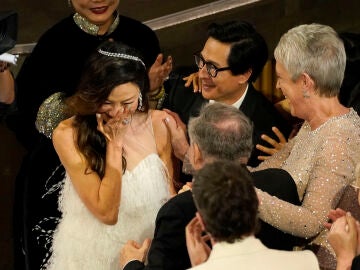
The film “Everything at once everywhere”, by directors Daniel Kwan and Daniel Scheinert, swept the 95th edition of the Oscars by bagging seven awardsincluding those for best film, best director and best actress, which went to the Malaysian Michelle Yeoh.
He only needed to win the Oscar for best actor to round off the plenary in the three main categories, but the Hollywood Academy opted for the American Brendan Fraser, for “The Whale”, in the season of his return to the elite of the industry . Kwan and Scheinert dedicated the best director award to “all the mothers in the world” because they are the “true heroines”, in a clear allusion to the plot of the film, which deals with a mother with the ability to travel to universes and dimensions parallel.
“This is proof that, with hope, dreams come true. Don’t let anyone tell you that you can’t. Thanks to my mother, she is the real superhero“, agreed later Yeoh, who became the first Asian to be recognized in this section, after receiving her award.
For the male category of this award, Fraser took the stage completely excitedwith a nervous laugh and stating that “this must be something similar to the multiverse”, in another nod to the movie of the night.
In addition, the phenomenon “Everything at once everywhere” won in four other sections: Best Original Screenplay, Editing, Best Supporting Actor and Best Supporting Actress. For their part, Ke Huy Quan, who returned to Hollywood almost four decades later, and Jamie Lee Curtis, who won the first Oscar for which she has been nominated since she appeared on the big screen with “Halloween” (1978), triumphed in the categories of best actor and best supporting actress also in “Everything at once everywhere”.
‘All quiet on the front’, protagonist in the shadow
The German film “All Quiet on the Front” (Netflix), by Edward Berger, was the other great protagonist by winning four Oscars in the sections of best photography; best production design; best soundtrack; and best international film, beating the Latin representative “Argentina, 1985”.
The two big disappointments of the night were “Los Fabelmans” and “Almas en banjo de Inisherin”, which had seven and nine nominations, respectively, and They didn’t even get to release their locker.
In an edition whose nominations combined successful independent films and author cinema sponsored by “streaming” platforms, there was hardly any room for the Hollywood blockbusters “Avatar: The Sense of Water” and “Top Gun: Maverick”, which they competed for various technical awards and for best film.
Both films were received with gratitude by the industry for being a relief to the post-pandemic box office, but they only captured their name in the category of best special effects, in the case of the work of James Cameron; and best sound for the film directed by Joseph Kosinski.
Among other technical sections, the Academy recognized the work on makeup of “The Whale”, a film in which Fraser, winner of the Oscar for best actor, became a person with morbid obesity; and the costume design for “Black Panther: Wakanda Forever,” which he dedicated to Ruth. E. Carter as the first African-American to win two Oscars.
Another of the most anticipated moments It was Rihanna’s performancewho performed the song “Lift Me Up” from this same film, nominated for best song, and who saw how the statuette escaped and fell to the composition “Naatu Naatu”, from the Indian film “RRR”.
Guillermo del Toro, the only Latino winner
Guillermo del Toro won the Oscar for best animated film for “Pinocchio” (Netflix) in which it was the first award given at the ceremony. “The animation is ready to be taken to another dimension and to be taken more into account”, assured the filmmaker after collecting what is his third golden statuette after the two he won – best film and best director – for “The Shape of Water” (2017).
His compatriot Alfonso Cuarón did not enjoy the same luck because the short film he co-produced, “Le Pupille”, He was not chosen by the Hollywood Academy. The timid Latin representation this year was completed by Ana de Armas, who could not prevail in the category of best actress, and the film “Argentina, 1985”, which was not awarded either.
Source: Lasexta
Bruce is a talented author and journalist with a passion for entertainment . He currently works as a writer at the 247 News Agency, where he has established himself as a respected voice in the industry.












